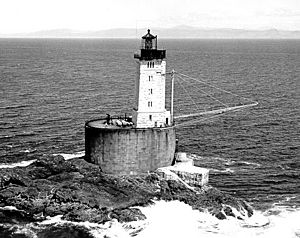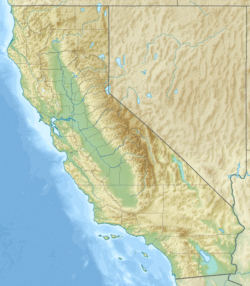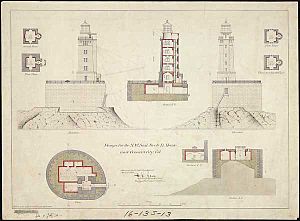St. George Reef Light facts for kids
 |
|
| St. George Reef Light. The manmade granite caisson is five stories high by itself, and waves regularly crash that high. The boom was used to lift supply launches on to the landing platform below. | |
|
|
|
| Location | Six miles off Point St. George |
|---|---|
| Coordinates | 41°50′11″N 124°22′33″W / 41.83633°N 124.37587°W |
| Year first constructed | 1892 |
| Deactivated | 1975-2012 |
| Foundation | elliptical concrete and granite basement |
| Construction | granite tower |
| Tower shape | square tower with balcony and lantern |
| Markings / pattern | white tower, black lantern |
| Height | 90 feet (27 m) |
| Focal height | 146 feet (45 m) |
| Original lens | First Order Fresnel lens (removed in 1983 and displayed at Del Norte County Museum) |
| Characteristic | Fl W 12s. |
| Admiralty number | G4418 |
| ARLHS number | USA-793 |
| USCG number | 6-0561 |
The St. George Reef Light is a famous old lighthouse. It stands on North West Seal Rock, about six miles (10 km) off the coast of northern California. This lighthouse is near a town called Crescent City.
Contents
Why Was It Built?
The St. George Reef Light is a "wave-washed" lighthouse. This means the ocean waves crash against it from all sides. It was built on North West Seal Rock, which is part of a group of rocks called "Dragon Rocks." Sir Francis Drake gave them this name long ago.
The decision to build this lighthouse came after many ship accidents. A big one was the sinking of the Brother Jonathan on July 30, 1865. Many important people were lost on that ship. This event made people realize a lighthouse was urgently needed.
Even with the urgent need, it took a long time to finish. The lighthouse was not completed until 1892. This was because money from the government was not always available. Most lighthouses had a separate house for the keepers and a tower for the light. But at St. George Reef Light, the living areas and the light tower were all in one strong building. It looked like a medieval castle. This building sat on a 50-foot (15 m) tall base.
Building This Giant Lighthouse
The St. George Reef Light first shone on October 20, 1892. It stands 144 feet (44 m) above the water. Workers first surveyed the rock in 1882. Construction started in 1883. They blasted the reef rock to create a stepped pyramid shape. This shape helped anchor the lighthouse to the rock.
The huge granite stones came from a quarry near the Mad River. Trains carried the stones across the Arcata bottoms. Then, loaded train cars were put on barges. These barges were pulled across Humboldt Bay to the building yard. Skilled workers shaped each stone to fit perfectly. Every stone had to be exact to create a strong wall against the ocean.
Building the lighthouse was slow for many years. This was because the US Congress did not always provide enough money. The work finally finished in 1891. But the lighthouse had to wait for its special lens to arrive from France. The lens came the next year. When the light finally started working in 1892, it had cost $752,000. This made it the most expensive lighthouse ever built in the US at that time. It cost more than twice the first guess!
Life at the Lighthouse
Working at St. George Reef was one of the hardest jobs for lighthouse keepers. It was very far away from land. The seas around it were wild and dangerous. Many people faced dangers during its building and operation. Some keepers found the job too tough and left. It was a very stressful and lonely place to work.
Supplies arrived by boat. The whole boat was lifted by a large crane onto a platform at the base of the lighthouse. Big storms often sent waves crashing over the top deck of the lighthouse. In 1952, storm waves even broke windows in the lantern room. This room is 150 feet (46 m) above sea level! Seawater poured down the tower's stairs.
Saving the Lighthouse
The St. George Reef Light was replaced by a "floating lighthouse" buoy in 1975. It was then turned off. Its 8-foot (2.4 m)-tall Fresnel lens was taken out in 1983. You can now see this amazing lens at the Del Norte County Historical Museum in Crescent City.
In 1996, the lighthouse was given to the St. George Reef Lighthouse Preservation Society. This group works to fix up the lighthouse. They also offer tours by helicopter from October to June. The lighthouse was turned back on on March 10, 2012. Its light can be seen from Brookings, Oregon, all the way to Crescent City, California.
After 16 years of safe tours, the helicopter flights stopped for a short time. This was because the society needed a special permit for the heliport. Tours started again in 2018 after a proper heliport was built at the base of the tower.
The lighthouse is a very important historical site. It was added to the National Register of Historic Places on December 9, 1993. It was even featured on a US postage stamp in 2007.
Images for kids
 | Emma Amos |
 | Edward Mitchell Bannister |
 | Larry D. Alexander |
 | Ernie Barnes |




